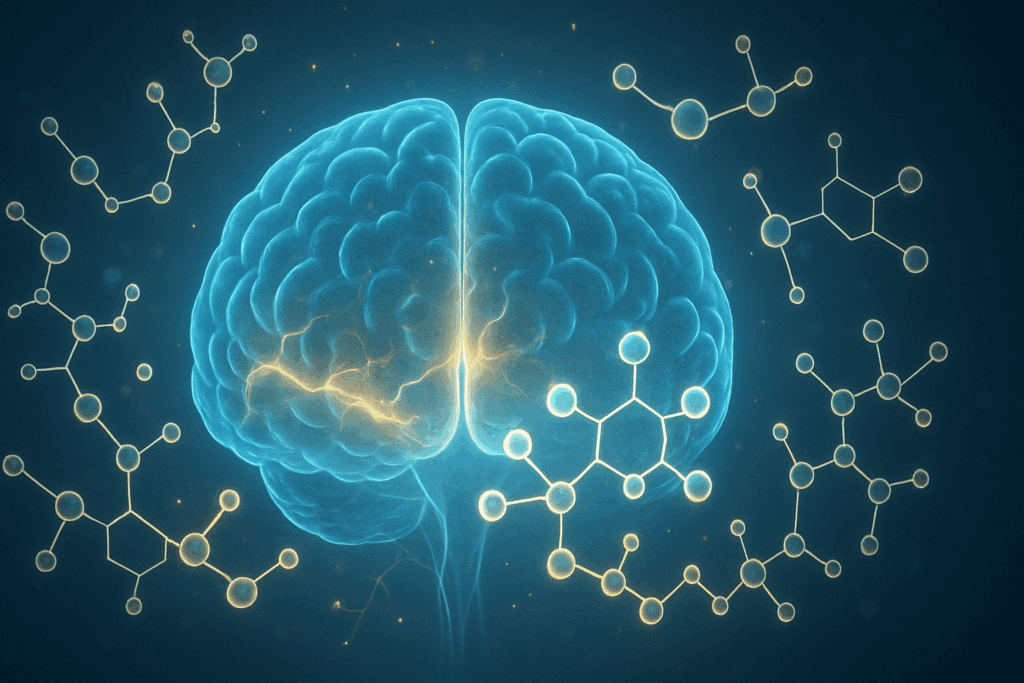Brain fog—a frustrating mental cloudiness that impairs focus, clarity, and memory—affects millions of people worldwide. From students to professionals to aging adults, this cognitive malaise can reduce productivity and diminish quality of life. While brain fog may stem from various sources including stress, poor sleep, and medical conditions, nutrition is one of the most overlooked yet impactful factors. Emerging research and nutritional science now point to a specific nutrient that may help alleviate this mental fatigue: choline. And among dietary sources, eggs stand out as one of the richest and most bioavailable reservoirs of this brain-boosting compound. This article explores how choline in eggs may help combat brain fog, while clarifying the differences in choline content between egg yolk and egg white, providing you with evidence-based insights to optimize cognitive function naturally.
You may also like: Citicoline vs Alpha GPC: Which Choline Source Offers the Greatest Cognitive Support?

Understanding Brain Fog: Causes and Cognitive Implications
Brain fog is not a formal medical diagnosis, but rather a descriptive term for a cluster of cognitive symptoms that include forgetfulness, difficulty concentrating, slowed thinking, and mental fatigue. While these symptoms can be transient, recurring brain fog may signal deeper issues such as nutritional deficiencies, hormonal imbalances, or underlying neurological conditions. Stress and lack of sleep are two of the most common contributors, disrupting the body’s natural circadian rhythms and impairing neurotransmitter function. Additionally, chronic inflammation, insulin resistance, and environmental toxins have all been implicated in the disruption of cognitive clarity.
On a biochemical level, brain fog often reflects impaired neurotransmission and weakened synaptic signaling. This can arise from low levels of acetylcholine—a critical neurotransmitter involved in learning and memory. Because acetylcholine is synthesized from choline, ensuring adequate dietary choline intake becomes essential. It is here that eggs, particularly egg yolks, offer a promising solution.

Choline in Eggs: A Cognitive Cornerstone
Choline is a water-soluble nutrient often grouped with the B-vitamins due to its crucial role in cellular metabolism and brain health. It serves as a precursor to acetylcholine, helping transmit signals between neurons. Additionally, choline is involved in the formation of phosphatidylcholine and sphingomyelin—key components of brain cell membranes. Without adequate choline, these structures degrade, impairing both brain integrity and function.
Eggs are one of the most efficient dietary sources of choline, both in terms of content and bioavailability. One large egg contains approximately 147 mg of choline, the majority of which is found in the yolk. For adults, the recommended adequate intake (AI) for choline ranges from 425 mg per day for women to 550 mg for men, meaning that a single egg can provide about 25–35% of the daily requirement. This makes eggs an accessible and cost-effective way to support brain health, especially for those struggling with concentration and mental fatigue.

Egg Yolk Choline: The Nutrient-Dense Core
When it comes to maximizing the choline benefits of eggs, the yolk is where the power resides. Egg yolk choline concentration is significantly higher than in the egg white. In fact, almost all of the choline in eggs is located in the yolk, making it the most nutrient-dense component for cognitive enhancement. Beyond choline, the yolk is also rich in vitamins A, D, E, and K, as well as omega-3 fatty acids and antioxidants like lutein and zeaxanthin, which further support brain and eye health.
Research indicates that egg yolk choline is not only abundant but also highly bioavailable, meaning it is efficiently absorbed and utilized by the body. This is particularly important for individuals with increased cognitive demands, such as students, professionals in high-stakes environments, and older adults experiencing age-related memory decline. While egg yolks were once stigmatized due to their cholesterol content, contemporary research has largely debunked the notion that dietary cholesterol directly translates to increased blood cholesterol in most individuals. The cognitive advantages of egg yolk choline far outweigh any outdated concerns, especially when eggs are consumed as part of a balanced diet.
Choline in Egg White: Limited but Not Absent
Although the egg white is often praised for its high protein content and low fat, it contains only trace amounts of choline. The question, “is choline in egg yolk or white,” is easily answered by comparing the nutrient content: nearly all the choline resides in the yolk. However, this does not mean that egg whites are nutritionally irrelevant. Their high-quality protein and low-calorie profile can be beneficial in specific dietary contexts, particularly for individuals aiming to increase protein intake while managing fat consumption. But when the goal is cognitive enhancement or the alleviation of brain fog, relying solely on egg whites would be insufficient.
That said, combining whole eggs—both yolk and white—ensures a more balanced intake of both choline and protein. For those with dietary restrictions or preferences that limit yolk consumption, it may be necessary to seek choline from other sources such as liver, soybeans, or supplements. Still, the superior choline concentration found in egg yolks makes them an unparalleled natural option for cognitive support.

How Choline Supports Cognitive Function and Mental Clarity
Choline’s influence on brain health extends beyond its role in neurotransmitter synthesis. It also supports methylation—a biochemical process essential for DNA repair, gene expression, and detoxification. Efficient methylation contributes to better stress resilience, hormonal balance, and energy metabolism, all of which are necessary for maintaining mental clarity and focus. Inadequate choline levels can lead to disrupted methylation pathways, which in turn may contribute to fatigue, irritability, and cognitive sluggishness.
Moreover, choline plays a protective role against neurodegeneration. Animal studies and emerging clinical data suggest that higher choline intake is associated with improved memory and reduced risk of conditions like Alzheimer’s disease. Prenatal and early childhood choline intake has also been linked to improved cognitive outcomes, underscoring its role in brain development and long-term neural function. For adults, this translates into the potential for sharper memory, faster information processing, and reduced cognitive fatigue.
From an experiential standpoint, individuals who increase their choline intake—particularly from egg yolks—often report improved focus, greater mental stamina, and reduced sensations of brain fog. These subjective benefits are likely the result of enhanced synaptic activity, better neurotransmitter function, and improved cellular health in the brain.

Integrating Eggs into a Brain-Healthy Diet
To capitalize on the cognitive benefits of choline in eggs, it is essential to incorporate them strategically into your daily nutrition. While eating eggs every day can be a healthy practice for most individuals, variety and balance are key. Ideally, eggs should be paired with other brain-supportive foods such as leafy greens, berries, fatty fish, and whole grains. This synergistic approach enhances nutrient absorption and provides a wide spectrum of antioxidants, vitamins, and minerals that support overall brain function.
Cooking methods also matter. Boiled or poached eggs preserve the integrity of the yolk, whereas excessive frying may degrade some of the sensitive nutrients. For those concerned about dietary cholesterol or calorie intake, it is important to consult a healthcare provider or nutritionist to determine an appropriate egg consumption level. In most cases, consuming one to two whole eggs daily is considered safe and beneficial.
The Importance of Dietary Context and Individual Needs
While eggs are a powerful source of choline, they are not a one-size-fits-all solution. Individual responses to dietary cholesterol, fat intake, and egg consumption can vary significantly due to genetics, pre-existing health conditions, and metabolic differences. For instance, people with certain lipid disorders or sensitivities may need to moderate their yolk intake, despite the cognitive benefits it may offer. In such cases, supplementing with choline or incorporating alternative sources like fish, legumes, and cruciferous vegetables may be more appropriate.
Furthermore, it’s worth noting that choline requirements increase during pregnancy, lactation, and periods of high mental demand. This makes targeted dietary planning even more important during these life stages. For example, pregnant individuals often benefit from increased choline to support fetal brain development. In such scenarios, eggs serve as a convenient and efficient dietary tool to meet elevated nutritional needs.
Current Research and Future Directions
Scientific interest in choline and its impact on cognitive function is rapidly expanding. Recent clinical studies have begun to uncover associations between choline intake and improved brain performance across age groups. One study published in the American Journal of Clinical Nutrition found that higher dietary choline intake was associated with better cognitive performance in middle-aged adults. Another investigation highlighted that choline supplementation improved memory and reduced markers of inflammation in older populations.
At the same time, researchers are exploring the epigenetic effects of choline—how it influences gene expression and brain development across generations. This line of inquiry suggests that choline’s benefits may extend beyond the individual, potentially offering long-term cognitive advantages to offspring. As more data becomes available, it may soon be possible to develop personalized dietary strategies based on choline metabolism and genetic profiles.
These findings reinforce the value of including choline-rich foods like eggs in the diet. However, they also highlight the need for public health awareness around the importance of choline—an essential nutrient that remains under-consumed by a significant portion of the population.

Debunking Myths: Eggs, Cholesterol, and Brain Health
Despite robust evidence supporting the brain benefits of egg yolk choline, misconceptions about eggs and cholesterol persist. For years, dietary guidelines advised limiting egg intake due to fears of increased cardiovascular risk. However, contemporary nutritional science has largely refuted this concern. Multiple large-scale studies have shown that in most people, dietary cholesterol has a minimal effect on blood cholesterol levels. Instead, saturated fats and overall diet quality play a more significant role.
Moreover, the cholesterol found in egg yolks is necessary for brain function. The brain is the most cholesterol-rich organ in the body, using cholesterol to construct cell membranes and produce hormones that regulate mood and cognition. When consumed as part of a balanced diet, eggs can support—not sabotage—neurological health.
This shift in understanding is especially important for those seeking natural remedies for brain fog. By avoiding egg yolks due to outdated cholesterol fears, many individuals may unknowingly deprive themselves of one of the most effective nutritional tools for mental clarity. In short, embracing whole eggs can be both a heart-smart and brain-smart decision, provided it aligns with individual dietary needs.
Why Choline Deserves a Place in Cognitive Wellness Conversations
Given its multifaceted role in brain health—from neurotransmitter production to cellular structure and gene expression—choline deserves more attention in discussions about cognitive wellness. While popular nootropics and supplements often dominate the conversation, foundational nutrients like choline offer a powerful, research-backed alternative that is both affordable and accessible. Eggs, particularly their yolks, provide an ideal vehicle for choline intake, delivering this essential nutrient alongside a host of complementary vitamins and minerals.
In the realm of brain fog solutions and cognitive enhancement, focusing on dietary fundamentals is often more effective than chasing trendy supplements. Choline in eggs offers a compelling case for the power of food as medicine. By choosing to include choline-rich foods in the diet, individuals can take proactive steps toward enhancing memory, focus, and overall brain vitality.
Frequently Asked Questions: Choline in Eggs and Cognitive Health
1. What makes choline in eggs more effective than choline from plant-based sources?
Choline in eggs is considered more bioavailable than choline derived from most plant-based sources. This means the body can absorb and use it more efficiently, making it particularly beneficial for individuals with increased cognitive demands. Unlike many plant-based choline sources, which often come bound in phospholipid forms that require more energy to break down, egg yolk choline is easily assimilated. Moreover, eggs also contain complementary nutrients like vitamin B12 and DHA, which work synergistically with choline to support brain health—something rarely found in plant sources. For individuals on plant-based diets, this poses a unique nutritional challenge, requiring careful planning or supplementation to match the efficacy of choline in eggs.
2. How does age affect the body’s ability to utilize choline in eggs for brain health?
As we age, our liver’s capacity to produce endogenous choline can diminish, making dietary intake increasingly important. Older adults may also experience decreased absorption efficiency, meaning the same amount of choline in eggs might have a less pronounced effect compared to a younger individual. Nevertheless, egg yolk choline still plays a crucial role in mitigating age-related cognitive decline by supporting acetylcholine production and cellular membrane integrity. Since aging brains are more susceptible to oxidative stress and inflammation, the high concentration of antioxidants and essential fatty acids accompanying choline in eggs provides added protective value. Consequently, regular consumption of whole eggs can be a valuable dietary strategy for preserving mental acuity in later years.
3. Can cooking methods alter the effectiveness of choline in eggs?
Yes, cooking methods can influence the structural integrity and bioavailability of choline in eggs. High-heat preparation methods such as frying at very high temperatures can cause nutrient degradation, especially in the yolk, where most of the choline resides. On the other hand, gentle cooking techniques like poaching or soft boiling help preserve egg yolk choline, ensuring optimal nutrient retention. Interestingly, while raw egg yolk may preserve choline, it carries a risk of bacterial contamination and reduced protein digestibility, making light cooking the safest and most effective approach. Therefore, how you prepare your eggs can significantly impact how much functional choline you actually absorb.
4. How do individual genetics impact choline metabolism and the need for egg yolk choline?
Genetic variations, particularly in genes like PEMT and MTHFD1, can significantly influence how efficiently the body synthesizes and uses choline. Individuals with less efficient methylation pathways may require more choline from external sources, making egg yolk choline an even more critical dietary component. These genetic factors mean that two people consuming the same amount of choline in eggs could experience vastly different physiological outcomes. For some, inadequate choline intake could lead to symptoms of cognitive fatigue, poor liver function, or hormonal imbalances. Understanding one’s genetic predisposition through testing can help tailor dietary choices, particularly around whether choline in egg yolk or white can meet their metabolic needs.
5. What are the implications of low dietary choline intake on emotional and psychological well-being?
Low choline intake can affect more than just memory and focus—it may also play a role in mood regulation. Choline contributes to the synthesis of acetylcholine, which interacts with several neurotransmitter systems involved in stress responses and emotional processing. A deficiency could contribute to irritability, increased anxiety, and even depressive symptoms over time. Because egg yolk choline supports the nervous system’s structural and functional integrity, maintaining sufficient intake may provide resilience against stress-induced cognitive and emotional dysregulation. In this context, the inclusion of choline in eggs is not just a cognitive enhancer but a potential stabilizer of psychological well-being.
6. Are there any risks of excessive choline intake from eggs?
While choline is essential, excessive intake—especially from supplements—can lead to adverse effects such as low blood pressure, fishy body odor, or gastrointestinal discomfort. However, reaching such high levels from food alone, including choline in eggs, is quite rare. Most people would need to consume over a dozen eggs per day consistently to approach the upper tolerable intake level for choline. Nonetheless, individuals with certain metabolic disorders or liver conditions should consult healthcare providers before increasing egg consumption significantly. Overall, when consumed in moderation, egg yolk choline provides a safe and effective means to support cognitive function without significant health risks.
7. How does choline in egg white compare to synthetic choline supplements?
Choline in egg white is present in minimal amounts and lacks the nutrient density found in egg yolks or concentrated supplements. However, it is naturally balanced with high-quality protein, which may support amino acid metabolism and overall satiety. Synthetic supplements often provide a higher dose but lack the synergistic micronutrients that accompany egg yolk choline, such as folate, B12, and omega-3s. For individuals unable to consume eggs, supplements offer a viable alternative, though they may require co-nutrients to achieve comparable cognitive effects. While choline in egg white is not a major contributor to choline status, it still offers trace support in diets where every bit counts.
8. Can athletic performance or recovery be improved through egg yolk choline consumption?
Emerging research suggests that choline may influence muscle control, nerve signaling, and post-exercise recovery. Egg yolk choline, due to its role in acetylcholine synthesis, may help optimize neuromuscular coordination during workouts. Athletes undergoing strenuous training regimes might experience enhanced motor performance and reduced fatigue when consuming adequate choline in eggs. Additionally, choline’s role in methylation may support faster tissue repair and inflammation resolution. For athletes looking for a natural edge, integrating egg yolk into post-workout meals could offer both cognitive and physical recovery benefits.
9. Is there a difference in how men and women respond to choline in eggs?
Yes, gender differences can influence both choline metabolism and requirements. Women of childbearing age, for example, often have higher choline needs due to estrogen-related modulation of choline-synthesizing enzymes. Pregnant and lactating women benefit significantly from egg yolk choline, which supports fetal brain development and maternal neurological health. In men, dietary choline has been linked to improved liver function and potentially better sperm quality, though more research is needed. These differences underscore the importance of tailoring choline intake to individual biological and hormonal contexts, with eggs serving as a versatile solution.
10. How might future research expand our understanding of choline in eggs and brain function?
Future studies may delve into personalized nutrition approaches, investigating how individual microbiomes and gene expressions affect the way choline in eggs is metabolized. Researchers are also exploring the long-term cognitive effects of early-life choline exposure, which could influence dietary guidelines for children and expectant mothers. Advances in neuroimaging may allow scientists to observe the real-time effects of egg yolk choline on brain connectivity and function. There is also growing interest in the potential for choline to act as a protective agent against neurotoxins and cognitive decline. As scientific tools become more precise, our understanding of the nuanced roles of choline in egg yolk and egg white will likely deepen, making dietary recommendations even more targeted and impactful.
Conclusion: Enhancing Mental Clarity with Egg Yolk Choline for Lasting Cognitive Health
In a world increasingly plagued by mental fatigue, distraction, and cognitive overload, the search for natural, evidence-based solutions to brain fog has never been more urgent. Choline in eggs stands out as one of the most promising and underutilized strategies for supporting mental clarity. The high concentration of egg yolk choline offers a potent, bioavailable source of this brain-essential nutrient, fueling neurotransmitter production, supporting neural integrity, and promoting efficient brain signaling.
Understanding the difference in choline content between egg yolk and egg white is essential for making informed dietary decisions. While choline in egg white is minimal, the yolk provides nearly all the cognitive benefits associated with egg consumption. When integrated into a diverse, nutrient-rich diet, whole eggs can play a central role in optimizing brain performance and reducing the cognitive drag associated with brain fog.
Ultimately, the path to clearer thinking and sharper memory does not require exotic supplements or radical diets. Sometimes, the key lies in something as simple—and delicious—as the humble egg. By embracing egg yolk choline as part of a holistic nutritional strategy, individuals can support their cognitive health today while laying the foundation for long-term mental vitality.
Was this article helpful? Don’t let it stop with you. Share it right now with someone who needs to see it—whether it’s a friend, a colleague, or your whole network. And if staying ahead on this topic matters to you, subscribe to this publication for the most up-to-date information. You’ll get the latest insights delivered straight to you—no searching, no missing out.
Further Reading:
Choline: The underappreciated nutrient that’s vital for our brains


